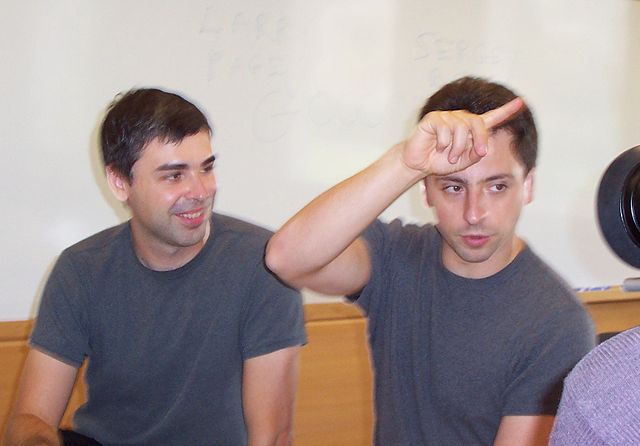Understanding the Cultural and Economic Significance of SEO
Although the average person on the street may not be familiar with the term “search engine optimization,” there is a good chance that every person in the Western world has been exposed to the impact of search engine optimization many times. Let us therefore delve into the history of Search Engine Optimization to understand how SEO started and how it works.
Search engine optimization (SEO) can be defined as “the process of maximizing the number of visitors to a particular website by ensuring that the site appears high on the list of results returned by a search engine.”[1]
In other words, SEO is a way for marketers to draw more attention to a website with the purpose of creating more publicity or traffic for commerce.
In today’s world, online commerce is an immensely lucrative area of business, with nearly $2 trillion of profit generated every year.[2]
The importance of SEO work, therefore, rests in the fact that a website’s visibility within a search engine is closely linked to its success.
When a potential customer performs a search for a certain term, such as “landscapers in my area,” for instance, SEO determines which business websites will appear at the top of the search results.

The customer is more likely to click on the first result that s/he sees; therefore, SEO is crucial for businesses to succeed.
The Evolution of SEO and Search Engines
To understand the significance of SEO, it is important to review not only the history of search engine optimization, but also the history of search engines. In the past two decades or so, the phrase “Google it” has become part of the Western cultural lexicon.
In fact, the verb “to Google” was officially added to the dictionary in 2006.[3]

In the modern world, “Googling” is synonymous with searching for something online. It is easy to forget that just twenty years ago or so, the search engine that we know as Google did not exist.
Typing in a search term to a box on a computer screen, hitting “enter,” and being given pages and pages of results within seconds was once unimaginable.
The Impact of SEO on Society and Business
If a person wanted to find information about a certain topic, s/he was required to go to the nearest library and perform hands-on research with the use of encyclopedias and various other reference books.
The research process was demanding and required a significant amount of personal effort. In terms of finding information about businesses and marketing, most consumers relied on the Yellow Pages or word-of-mouth recommendations. Businesses might also have billboards alongside roads or put advertisements in papers or magazines in order to create visibility. In the current information age, however, search engines have dramatically transformed society at every level.[4] Understanding the history of Search Engine Optimization highlights this evolution.
On a personal level, long trips to the library are no longer needed in order to find information. Search engines have also revolutionized more intimate areas of life, such as the dating scene. In the arena of business, search engines have made it easier than ever before for potential customers to access information, and for companies to advertise and reach out to new market audiences.
The First Search Engines
The first ever search engine was created in 1990. The engineers were Alan Emtage, who was a postgraduate student at McGill University, and Bill Heelan, who was a student at Concordia University but also worked at McGill.[5] The name “Archie” was derived from the word “archives.”[6] This milestone marks a significant moment in the history of Search Engine Optimization.
Archie began as a project for students and staff at McGill in 1987, and the aim of the project was to connect the McGill University School of Computer Science to the internet.
Archie was initially designed to enable users to search internet archives for information and acted as a database of website filenames.[7] When a user entered a query, Archie would match the query with relevant website names. Archie was rudimentary by today’s high-technology standards, but this early search engine prototype established a precedent for later search engines, such as Google.
After Archie paved the way in 1990, several other search engines were developed over the next few years. These early search engines included Archie’s immediate successors, Veronica and Jughead (1991), followed by VLib (1992), Excite (1993), WorldWide Web Wanderer (1993), ALIWEB (1993), and Primitive Web Search (1993).[8]
History of Search Engine Optimization shows that it was not until 1994, however, that several new search engines became widely accessible to the public. Infoseek and AltaVista were both launched in 1994, and provided a number of features that had not been available previously, such as unlimited bandwidth (AltaVista), natural language queries (AltaVista), and the ability for webmasters to submit a page in real time (Infoseek). WebCrawler and Yahoo!Search were also launched later in 1994, followed by Lycos and LookSmart (in early 1995).
The Advent of Google
In January of 1996, Sergey Brin and Larry Page started working on search engine called “BackRub,” which used backlinks as part of its algorithm and also used citation notation.

Larry Page and Sergey Brin, founders of Google
Citation notation was important because it meant that if a website was mentioned anywhere else on the web, this mention would count as a “vote” towards that website.
Additionally, a website’s reliability stemmed from how many people linked to that website, and also the trustworthiness of these linking sites. BackRub would eventually become Google.
In the meantime, Inktomi launched Hotbot in May, 1996 and Ask Jeeves (now Ask.com) was launched almost a year later, in April 1997.[9]
Finally, in 1998, Google launched under its current name. At the time, the PageRank technology used by Google was not recognized as important, and investors were not particularly interested in purchasing it. The PageRank technology would later go on to form the basis of SEO as it exists today.[10]
Although other search engines continued to be developed throughout the next decade and even relatively recently—Microsoft launched Bing in 2009–Google has dominated the search engine market for many years.
Google uses certain search algorithms, and the company guards these search algorithms carefully.[11]
Understanding the Role of Algorithms in Search Engine Optimization
The importance of search algorithms is central to understanding SEO. A search algorithm is used to retrieve information stored inside of a data structure.
Within the context of the internet, data structures can take the form of search trees, linked lists, arrays, hash tables, or other similar storage methods.[12]
There is no singular search algorithm that is used for all searches and for all search engines. Instead, different search algorithms are used based on the type of data structure that is being accessed.
Types of search algorithms include linear search algorithms, binary searches, and comparison search algorithms.[13]
Within the context of SEO, it is important to recognize that an excellent search engine does not simply return a list of pages that match a search query. Rather, the algorithm behind the search engine tries to answer the question that may lie beneath the search term.
Key Factors Influencing Search Rankings
The algorithms used by the major search engines, such as Google, are complex and consist of many factors. These factors include “hard factors,” or external influences, such as the total number of backlinks to a website or page, and also social media recommendations.[14]
Another set of factors stems from the page itself and how its creators construct it. Search engines analyze both external and internal factors to determine where they will rank a page in terms of search results. Another way of understanding these terms is to think of “on page” factors and “off page factors.”
The top ranking “on page” factors include Title Tags, Meta Descriptions, content quality, keywords used, and crawler friendliness.
The top ranking “off page” factors include authority, user engagement, and backlinks.[15]
Algorithm Updates and Their Impact
Over time, Google has made many changes and adjustments to its search algorithms. In fact, every year, Google changes its search algorithm between 500 and 600 times.[16]
Most of these changes are relatively minor; however, Google occasionally makes a major update to its algorithm that has a dramatic effect on the way that search results are collated.
As recently as March 2017, Google made one of these changes: this update is informally known as “Fred” (no formal name has yet been given). Reports indicate that ‘Fred’ has already had a major impact on the SEO community.[17]
Major updates in 2016 included Penguin 4.0, touted by experts as a “new, ‘gentler’ […] algorithm, which devalues bad links instead of penalizing sites.”[18] Penguin 4.0 is the latest version of Penguin, which was originally introduced in April, 2012.
Alongside Penguin, two of Google’s other major algorithm updates are Panda (first introduced in 2011) and Pigeon (first introduced in 2014). Developers design these algorithm updates to streamline user experiences, but they can also use them as a form of discipline for unruly websites.
For instance, Google introduced an algorithmic change called the “Intrusive Interstitial Penalty” in January, 2017, in order to “punish aggressive interstitials and pop-ups that might damage the mobile user experience.”[19]
Ranking Factors Influencing Google’s Search Algorithms
As mentioned above, all search algorithms rely on a number of “on-page” and “off-page” ranking factors when determining where a website listing will fall on the page of results.
According to a 2015 study, the top-ranking factors for search engines and their algorithms (including Google’s core algorithm) are ranked in order of importance as:
- Domain-level link features
- Page-level link features
- Page-level keyword and content-based features
- Page-level keyword agnostic features
- Engagement and traffic/query data
- Domain-level brand metrics
- Domain-level keyword usage
- Domain-level keyword-agnostic features
- Page-level social metrics.[20]
These factors were rated on a scale of 1-10, with 1 being “not influential” and 10 being “highly influential.” The first two factors on the list, domain-level link features and page-level link features, are both rated over 8 in terms of importance (8.22 and 8.19, respectively).[21] The lowest factor on this list, page-level social metrics, is rated 3.98. These factors and their ratings give a sense of the components that affect search algorithms and contribute to SEO.
SEO Trends
Given the fact that search algorithms change literally hundreds of times per year, and that these changes can affect SEO in numerous ways, the task of staying ahead of these changes and identifying long-term trends is understandably daunting.
There are, however, a number of SEO trends that experts have identified for 2017. The first factor relates to structured data mark-up, or “crawler friendliness.”[22]
Trend #1: Structured Data markup & Crawler Friendliness
According to Forbes, crawler friendliness is “especially important for showing up in Google search features like Quick Answers and Rich Card that rely heavily on machine learning. […] Google’s use of Quick Answers in search results jumped to over 40% in early 2016, and we can expect an even larger increase in the coming year.”[23]
Web developers use structured data markup or crawler friendliness to describe ‘things’ and ‘properties’ on a website.[24]
On a food blog that features recipes, structured data markup identifies the recipes as the ‘things’ and their components as the ‘properties,’ describing both categories. Websites can use structured data markup to provide richer, more user-friendly information for the Google algorithm to find and display.
Trend #2: Accelerated Mobile Pages
A second major SEO trend for 2017 is the use of accelerated mobile pages (AMP). Users perform an increasing number of searches with mobile devices rather than desktop computers. In 2015, mobile commerce increased three times more rapidly than ecommerce.[25]
To accommodate this consumer pattern, AMP offers a “stripped-down version of the mobile web.”[26] AMP strips away unnecessary information attached to a webpage, thereby facilitating optimal loading speed on a mobile device.
Studies indicate that loading speed is of top importance to mobile users; therefore, Google prioritizes AMP sites when the algorithm detects that the user is performing a search with a mobile device. Search engines penalize non-AMP sites, regardless of relevancy or content quality.[27] In this sense, AMP resembles the “MobileGeddon” of 2015, a notable event in the history of Search Engine Optimization.
MobileGeddon was a state of panic that arose when companies became concerned that search engines would penalize their websites for not being mobile-friendly.[28] Although AMP enables Google to prioritize mobile-friendly sites, developers have stripped AMP down and made it easy to implement for almost any website. Therefore, a reoccurrence of MobileGeddon in 2017 is unlikely.
Trend #3: User Search Intent
A third SEO trend for 2017 is further optimization for user search intent. Although the concept of optimizing for user intent is not new and is arguably at the heart of all search algorithms, experts have noted that “brands are still failing to make user search intent a key part of their SEO strategy.”[29]
SEO strategies can implement user search intent in a few key ways, including delivering immediate answers or clarification, guiding the searcher to a pre-determined destination, and providing interactive assistance to complete a task or purchase.
These considerations require more sophisticated forethought and consideration in order to maximize SEO.
Black Hat and White Hat SEO Strategies
In developing an SEO strategy, website developers have also sometimes turned to what are known as “black hat” techniques.
‘Black hat’ refers to actions that aim to immediately boost SEO rankings, but search engines discourage these practices and may penalize them, ultimately harming rankings and traffic.
While ‘white hat’ SEO techniques are conventional and ethical, the somewhat unethical ways ‘black hat’ SEO practices appeal to the algorithm itself, rather than to the people who are searching, characterize them.[30]
According to Wodehouse, “In a way, it’s ‘cheating the system’ to get quick turnaround results.
But, if you’re found using these techniques, your site can be penalized—and in some cases, de-indexed altogether.”[31]
Marketers typically use black hat SEO on sites that benefit from a ‘quick-return business model,’ employing tactics such as spam, ‘scraped’ or duplicate content, content automation with little value for users, negative campaigns aimed at competitors, and gateway pages that attract users with certain keywords before redirecting them to unrelated pages. Although some people continue to use black hat techniques, the history of Search Engine Optimization shows that Google and other search engines have reduced the trend by exacting penalties; white hat techniques remain more common.[32]
Consumer Search Behavior
Along with trends in terms of the SEO techniques used by website developers and companies, there are also some observable trends in terms of consumer search patterns.
Mobile Search
We have already mentioned the tendency towards mobile searches and accessibility. Users perform approximately 50% of all searches on a mobile device, and the majority occur via a smartphone.
Along with the devices people use, another trend relates to how users phrase search terms. Formerly, search terms used questions such as “who is” and “what is.” The current trend is towards more complex questions, such as “how to” and “why.”[33]
These more ambiguous terms are possible because of the ever-increasing complexity of search engine algorithms.
Local Search
History of Search Engine Optimization shows that another common trend is for local amenities. According to Ratcliff, “‘Near me’ searches have grown 34 times since 2011, and as you would expect, 80% of these are on mobile.”[34] An awareness of these consumer search trends is crucial for successful SEO implementation.
The Future of SEO
The future of SEO work is bright already and promises to get brighter. As technology continues to advance and search algorithms become increasingly complex and sophisticated, businesses will have more need than ever before to make sure that they use SEO techniques to gain more traffic and visibility online.
Because SEO is crucial to success in an online commerce environment, working as a professional SEO specialist has rapidly become a desirable and lucrative profession.[35]
Before algorithms and SEO techniques became more sophisticated, web masters used to perform basic SEO for the websites they managed. As ecommerce and mobile commerce has continued to boom, SEO specialists have developed into a field of their own.
SEO Jobs
History of Search Engine Optimization shows that the demand for skilled SEO experts is considerable and continues to rise. SEO specialists can work as solo freelancers or for a company; average salaries for SEO specialists can reach over $80,000 per year.
For many individuals with a marketing, design, web development or web administration background,
SEO offers a way to stay abreast of the most cutting edge changes in technology while applying skills to assist individual companies reach their goals.
Citations
Foundations of SEO
[1] Shenoy, Aravind, and Anirudh Prabhu. “Introduction to SEO.” In Introducing SEO, pp. 1-8. Apress, 2016.
[2] eMarketer. “Worldwide Retail Ecommerce Sales Will Reach $1.915 Trillion This Year.” August 22, 2016. https://www.emarketer.com/Article/Worldwide-Retail-Ecommerce-Sales-Will-Reach-1915-Trillion-This-Year/1014369
[3] Masnick, Mike. “Attention English Teachers: Google is Officially a Verb.” TechDirt. July 5, 2006. https://www.techdirt.com/articles/20060705/232200.shtml
[4] Büttcher, Stefan, Charles LA Clarke, and Gordon V. Cormack. Information retrieval: Implementing and evaluating search engines. Mit Press, 2016.
[5] Bostan, Shekoofe, and Mohamad Ghasemzadeh. “Personalization of Search Engines, Based-on Comparative Analysis of User Behavior.” Journal of Advances in Computer Research 6, no. 2 (2015): 65-72.
[6] Ibid.
[7] Ibid.
[8] WordStream. “The History of Search Engines—An Infographic.” https://www.wordstream.com/articles/internet-search-engines-history
[9] Ibid.
[10] Ibid.
Search Algorithms and Optimization Techniques
[11] Lohr, Steve. “Google Schools Its Algorithm.” The New York Times, March 5, 2011. https://www.nytimes.com/2011/03/06/weekinreview/06lohr.html
[12] Büttcher, Stefan, Charles LA Clarke, and Gordon V. Cormack. Information retrieval: Implementing and evaluating search engines.
[13] Ibid.
[14] Shepard, Cyrus. “Announcing the 2015 Search Engine Ranking Factors Study.” Moz, August 11, 2015. https://moz.com/blog/ranking-factors-2015
[15] Casella, Marcel. “Search Engine Optimization: An Overview.” OverTheTopSEO. https://www.overthetopseo.com/search-engine-optimization-overview/
[16] “Google Algorithm Change History.” Moz. https://moz.com/google-algorithm-change
[17] Ibid.
[18] Ibid.
[19] Ibid.
[20] “Search Engine Ranking Factors 2015: Expert Survey and Correlation Data.” Moz. https://moz.com/search-ranking-factors
[21] Ibid.
[22] Olenski, Steve. “3 SEO Trends That Matter in 2017.” Forbes. 2017. https://www.forbes.com/sites/steveolenski/2017/02/22/3-seo-trends-that-matter-in-2017/2/#552d44e31794
[23] Casella, Marcel. “Search Engine Optimization: An Overview.”
Industry Trends and Ethical Considerations
[24] Olenski, Steve. “3 SEO Trends That Matter in 2017.”
[25] Ibid.
[26] Ibid.
[27] Ibid.
[28] Enge, Eric. “Mobilegeddon: Nearly 50% of Non-Mobile Friendly URLs Dropped in Rank.” Stone Temple Consulting (2015).
[29] Olenski, Steve. “3 SEO Trends That Matter in 2017.”
[30] Iredale, Sophie, and Aleksej Heinze. “Ethics and Professional Intimacy Within the Search Engine Optimisation (SEO) Industry.” In IFIP International Conference on Human Choice and Computers, pp. 106-115. Springer International Publishing, 2016.
[31] Wodehouse, Cary. “White Hat SEO vs. Black Hat SEO: What’s the Difference?” Upwork Global. 2017.
[32] Ibid.
[33] Ratcliff, Christopher. “Consumer Search Behavior: Stats and Trends.” Search Engine Watch, 2015.
[34] Ibid.
[35] Campbell, Ray Worthy. “A Comparative Look at Lawyer Professionalism: Contrasting Search Engine Optimization, Lawyering, & Law Teaching.” USFL Rev. 50 (2016): 401.
Sources
Bostan, Shekoofe, and Mohamad Ghasemzadeh. “Personalization of Search Engines, Based-on Comparative Analysis of User Behavior.” Journal of Advances in Computer Research 6, no. 2 (2015): 65-72.
Büttcher, Stefan, Charles LA Clarke, and Gordon V. Cormack. Information retrieval: Implementing and evaluating search engines. Mit Press, 2016.
Campbell, Ray Worthy. “A Comparative Look at Lawyer Professionalism: Contrasting Search Engine Optimization, Lawyering, & Law Teaching.” USFL Rev. 50 (2016): 401.
Casella, Marcel. “Search Engine Optimization: An Overview.” OverTheTopSEO.
eMarketer. “Worldwide Retail Ecommerce Sales Will Reach $1.915 Trillion This Year.” August 22, 2016.
Enge, Eric. “Mobilegeddon: Nearly 50% of Non-Mobile Friendly URLs Dropped in Rank.” Stone Temple Consulting (2015).
Iredale, Sophie, and Aleksej Heinze. “Ethics and Professional Intimacy Within the Search Engine Optimisation (SEO) Industry.” In IFIP International Conference on Human Choice and Computers, pp. 106-115. Springer International Publishing, 2016.
Lohr, Steve. “Google Schools Its Algorithm.” The New York Times, March 5, 2011.
Masnick, Mike. “Attention English Teachers: Google is Officially a Verb.” TechDirt. July 5, 2006.
Moz. “Google Algorithm Change History.” Moz. https://moz.com/google-algorithm-change
Moz. “Search Engine Ranking Factors 2015: Expert Survey and Correlation Data.” Moz. https://moz.com/search-ranking-factors
Olenski, Steve. “3 SEO Trends That Matter in 2017.” Forbes. 2017. https://www.forbes.com/sites/steveolenski/2017/02/22/3-seo-trends-that-matter-in-2017/2/#552d44e31794
Ratcliff, Christopher. “Consumer Search Behavior: Stats and Trends.” Search Engine Watch, 2015.
Shenoy, Aravind, and Anirudh Prabhu. “Introduction to SEO.” In Introducing SEO, pp. 1-8. Apress, 2016.
Shepard, Cyrus. “Announcing the 2015 Search Engine Ranking Factors Study.” Moz, August 11, 2015. https://moz.com/blog/ranking-factors-2015
Wodehouse, Cary. “White Hat SEO vs. Black Hat SEO: What’s the Difference?” Upwork Global. 2017.
WordStream. “The History of Search Engines—An Infographic.” https://www.wordstream.com/articles/internet-search-engines-history




